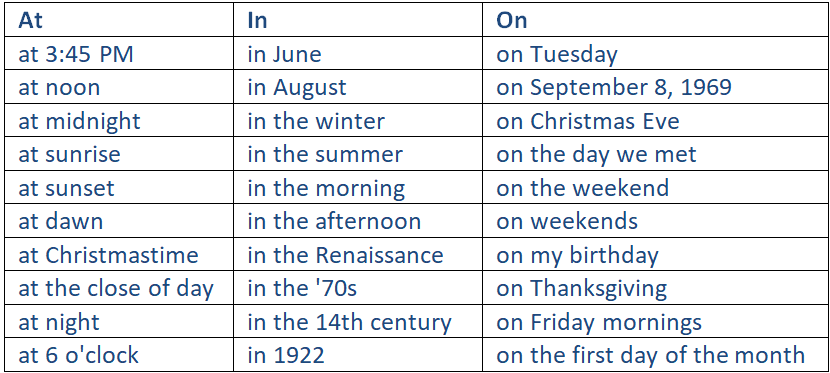


 Grammar
Grammar
 Tenses
Tenses
 Present
Present
 Past
Past
 Future
Future
 Parts Of Speech
Parts Of Speech
 Nouns
Nouns
 Verbs
Verbs
 Adverbs
Adverbs
 Adjectives
Adjectives
 Pronouns
Pronouns
 Pre Position
Pre Position
 Preposition by function
Preposition by function 
 Preposition by construction
Preposition by construction
 Conjunctions
Conjunctions
 Interjections
Interjections
 Grammar Rules
Grammar Rules
 Linguistics
Linguistics
 Semantics
Semantics
 Pragmatics
Pragmatics
 Reading Comprehension
Reading Comprehension|
Read More
Date: 31-5-2021
Date: 31-5-2021
Date: 31-5-2021
|
Time Prepositions
There are two types of time prepositions in English. First, we will take a look at the basic time prepositions at, in, and on. Secondly, we will cover the functional time prepositions after, before, by, during, for, from, in, to and until/till.
Basic Time Prepositions
The prepositions at, in and on are associated with specific time categories, which must be memorized. For example, we say "at 5 PM on Sunday in June" because English speakers use at with clock times, on with days, and in with months. Study the categories and the examples below.

To help you understand the time categories listed above, here are a few real-life examples of at, in and on to get you started.

On Christmas vs. At Christmas
Both on and at are used with holidays, but the meaning is different. On is used with specific days and at is used with holiday periods. For this reason, on Christmas means on Christmas Day (Dec. 25) whereas at Christmas means during the Christmas season (late December). There is a similar distinction with longer holidays, including Easter, Hanukkah, the New Year, Thanksgiving weekend, Chinese New Year etc.
Examples:
On Christmas, we always eat dinner at my grandparents' house. Christmas day
I love all the decorations at Christmas. Christmastime
No Prepositions with Tomorrow, Yesterday, Next, and Last
Do not use on with the words tomorrow or yesterday. Similarly, do not use at, in or on with any of the expressions listed above when they follow the words next or last.
Examples:
I went to the movies on yesterday. Not correct
I went to the movies yesterday. Correct
I went to the movies on last Tuesday. Not correct
I went to the movies last Tuesday. Correct
I graduated from college in last August. Not correct
I graduated from college last August. Correct
Functional Time Prepositions
The following time prepositions have a more functional usage and show how two or more events relate to each other in time. For example, Lisa jogs before dinner means Lisa jogs first and eats dinner second. These time prepositions can be hard to translate and are best learned through conversation.

To vs. Until vs. Till
Both to and until express similar ideas, but there is a difference in usage between the two words. To is a preposition, and it must be followed by a noun, most frequently a clock time such as 3:45 PM.
Until is both a preposition and an adverb, which means it is more flexible. Until can be followed by any time noun or even an entire clause. If you are confused, you can use until and that will always be right.
Till is a short, less formal version of until. Till (also written as 'til) is more common in spoken English, songs, and poetry.
Examples:
Jane stayed from 3:30 to 5:30.
Jane stayed from 3:30 until 5:30.
Jane stayed until the end.
Jane stayed till the end.
Jane stayed until every person in the room had left.
Jane stayed till every person in the room had left.
|
|
|
|
"عادة ليلية" قد تكون المفتاح للوقاية من الخرف
|
|
|
|
|
|
|
ممتص الصدمات: طريقة عمله وأهميته وأبرز علامات تلفه
|
|
|
|
|
|
|
المجمع العلمي للقرآن الكريم يقيم جلسة حوارية لطلبة جامعة الكوفة
|
|
|